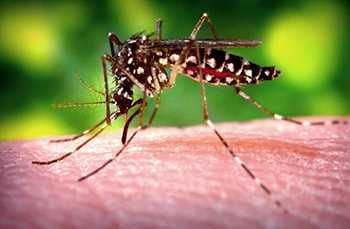Zika and Animals
What we know

Zika virus is transmitted to people primarily through the bite of an infected Aedes species mosquito (A. aegypti and A. albopictus). These are the same mosquitoes that spread dengue and chikungunya viruses. At this time there have been no reports of other animals becoming sick with Zika or of being able to spread Zika to people or other animals.
- At this time, animals other than mosquitoes do not appear to be involved in the spread of Zika virus.
- There is no evidence that Zika virus is spread to people from contact with animals other than mosquitoes .
- There have not been any reports of pets or other types of animals becoming sick with Zika virus. However, more research is needed to better understand Zika virus in animals.
Zika in animals
Zika virus was first discovered in a monkey with a mild fever in the Zika Forest of Uganda in the 1940s. Nonhuman primates (apes and monkeys) have shown the ability to become infected with Zika virus; but, only a few naturally and experimentally infected monkeys and apes have had any signs of illness at all, and then it was only a mild, transient fever without any other symptoms. A small number of monkeys were reported to have Zika virus in one study done in 2016 in an area of Brazil with high numbers of human illness. More research is needed to better understand the potential for monkeys and apes to be reservoirs for Zika virus. The prevalence of Zika virus in monkeys and other nonhuman primates is currently unknown.
There is also limited evidence from one study done in Indonesia in the late 1970s that horses, cows, carabaos (water buffaloes), goats, ducks, and bats could become infected with Zika, but there is no evidence that they develop disease or pose a risk for Zika virus transmission to humans. There have not been any reports of pets or other types of animals becoming sick with Zika virus. More information on Zika virus transmission is available here.
Zika and microcephaly in animal pregnancy
Microcephaly has not been reported among populations of monkeys and apes in areas with previous or ongoing Zika virus transmission. This type of birth defect has not been reported with Zika virus infection in animals living in or traveling to areas where Zika virus is present. However, more research is needed to better understand Zika virus and microcephaly in animal pregnancy.

Risk to monkeys and apes in the United States
The risk of monkeys and apes in the United States becoming infected with Zika virus is low. All monkeys and apes imported into the United States undergo a mandatory 31-day quarantine period on arrival.
- The monkeys and apes are held indoors or in screened enclosures where the risk of mosquito contact is low.
- Any monkey or ape that may have entered quarantine with an active Zika virus infection would not be able to pass it to others without mosquitoes.
- Monkeys and apes develop antibodies to Zika virus within 14 days of infection; once antibodies develop, a person or primate can no longer spread the virus. All imported monkeys and apes should be free of Zika virus by the end of the quarantine period and thus pose no risk of infecting local mosquito populations
Bringing pets or other animals into the United States
Some animals, including monkeys and apes, are not allowed to be imported as pets under any circumstances. Each state and US territory has its own rules for pet ownership and importation, and these rules may be different from federal regulations. You can find more information about animal importation here.
- Page last reviewed: June 29, 2017
- Page last updated: June 29, 2017
- Content source:





 ShareCompartir
ShareCompartir